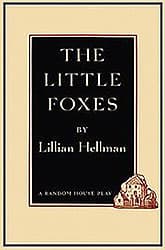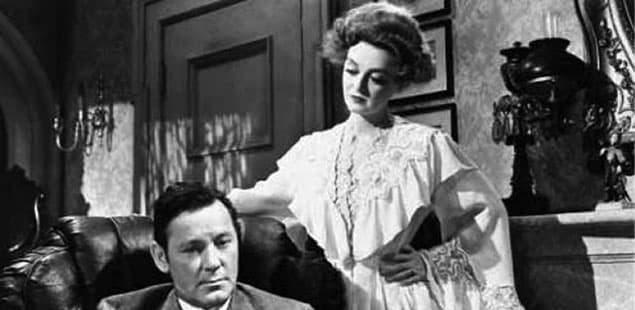The Little Foxes
Critique • Quotes • At the movies
 First edition
First editionFirst performed
1939, New York City
Literary form
Play
Genres
Drama
Writing language
English
Author's country
United States
Length
Three acts, approx. 21,500 words

Regina Giddens (Bette Davis) lords it over dying husband Horace (Herbert Marshall) in 1941 film.
Greed's dark victory acted out with deadly accuracy
The Little Foxes (1941): Film, 115 minutes; director William Wyler; writer Lillian Hellman, Arthur Kober, Dorothy Parker, Alan Campbell; featuring Bette Davis, Herbert Marshall, Teresa Wright, Richard Carlson
Wonderful film adaptation. So wonderful you might not even realize it is an adaptation of a stage play. And most remarkably, it's based on a screenplay by the playwright. Lillian Hellman had started as a screenwriter before she became a playwright and seems to have put her Hollywood experience to good use with The Little Foxes.
Usually film adaptations try to open up the play, take it off the stage and into the world with more scenery and secondary characters. The 1941 film of The Little Foxes certainly does this, with the aid of three writers, including the fabulous Dorothy Parker, who are credited for "additional scenes and dialogue". Legendary director William Wyler makes it fit together seamlessly.
But the real opening up is accomplished by building the character of Regina's daughter Alexandra, played by Teresa Wright who was nominated for an Academy Award for her performance. In the play she is merely an observer who adopts a contrary stance at the end, but in the movie we watch her go through the whole process from blithe innocence to disillusion to rebellion.
To help her along in the transformation, a new character is created—a cynical young journalist (Richard Carlson) who gradually wins both the girl's heart and her mind. Of course, adding a love interest for Alexandra couldn't but help the otherwise dark drama at the box office. The thus-expanded role of Alexandra launched Wright's film career and she would star in movies and on television for the next five decades.
The centre of the production however is still Regina, the deliciously bitchy and determined Southern belle who fights her brothers for her share—and then some—of the family fortune, ready to use every weapon at her disposal including her feminine wiles, blackmail and even murder. That character description in the 1940s must have sounded like a casting call for Bette Davis and she responded in spades. Davis took over the role from Tallulah Bankhead, a similar actress who had won acclaim as Regina on Broadway, and promptly won her own acclaim—and an Academy Award nomination—for the characterization.
The heart attack scene from 1941 film The Little Foxes.
The other Hubbards are played to brilliant effect by their stage originators, all seasoned character actors assured in their roles—the wily Ben by Charles Dingle, the slower Oscar by Carl Benton Reid, his fun-loving son Leo by Dan Duryea, and, in a wrenchingly pathetic turn, the abused Birdie, wife of Oscar, by Patricia Collinge.
Regina's ailing husband, Horace Giddens, is portrayed with quiet dignity by the accomplished Herbert Marshall. His simple exchanges with Alexandra, Birdie and Regina give the film a solid core. I'm not sure I believe his character of the honest banker who sees through human vanity and wants only what's best for everyone really exists in the real world, but I believe it while watching the film.
The most dramatic scene from the play, involving Horace and Regina, is ratcheted up in shock value in the movie—not by histrionics but by deadly cool acting and unflinching direction. A film seminar could take apart all the small glances, spoken inferences and physical stage business that lead up to this moment and its consequences. But here let's just say it's a classic sequence of acting and filmmaking.
The Little Foxes garnered a total of nine Academy Award nominations—including for director Wyler, writer Hellman and all the female leads—though it won none. That was the year that the uplifting How Green Was My Valley swept the awards, and the year that the dark Citizen Kane was similarly shut out, except for a writing award. This negative vision of America was not taken to voters' hearts, though it has continued to resonate in the years since.
— Eric

